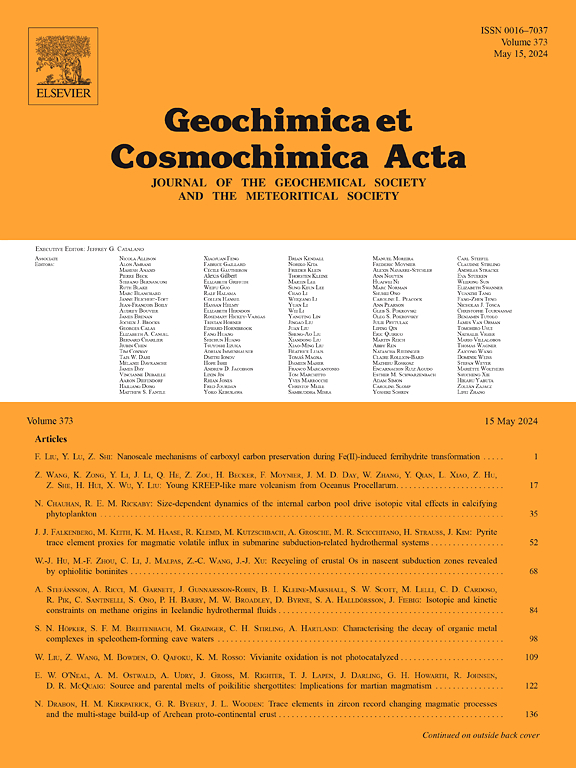油中惰性气体的溶解度诱导元素分馏建模
IF 4.5
1区 地球科学
Q1 GEOCHEMISTRY & GEOPHYSICS
引用次数: 0
摘要
本研究通过现有的经验和理论模型,并辅以基于分子模拟的新方法,探讨了烃基油中由溶解度引起的惰性气体元素分馏估算。量化这种分馏对于深入了解地下地质资源中的流体过程和迁移至关重要,而这一领域目前缺乏实验数据。为解决这一问题,研究引入了一个预测模型,该模型采用彭-罗宾逊状态方程和基于逸散系数的方法来评估碳氢化合物(包括普通烷烃、环烷烃和芳烃)中的惰性气体元素分馏。然而,该模型在精确定量预测方面存在困难,因此需要引入调整后的交叉作用参数来提高其性能。此外,分子模拟与改进的状态方程相结合,为计算不同烃类溶剂中惰性气体的分馏系数提供了一种新方法。一个重要发现是确定了一条通用的主曲线,表明在简单的烃溶剂中,低压下的惰性气体溶解度分馏可以仅通过温度和密度来定量确定,而无需详细的成分信息。因此,我们提出了一种新的关联方法,仅根据油温和密度就能推导出元素分馏系数,与现有的经验方法相比,这种方法在广泛的温度范围内都有显著的改进。虽然这种方法在应用于富含树脂和沥青质等复杂重组分的油类时存在局限性,但它可以解决在高温条件下传统使用的实验相关性中观察到的不一致问题。本文章由计算机程序翻译,如有差异,请以英文原文为准。
Modeling Solubility Induced Elemental Fractionation of Noble Gases in Oils
This study explores the estimation of solubility-induced elemental fractionation of noble gases in hydrocarbon-based oils through existing empirical and theoretical models, complemented by a novel molecular simulation-based approach. Quantifying such fractionation is essential for a deeper understanding of fluid processes and migration in subsurface geological resources, an area currently lacking in experimental data. To address this, the research introduces a predictive model that employs the Peng-Robinson equation of state and a fugacity-coefficient-based method to assess noble gas elemental fractionation in hydrocarbons, including normal alkanes, cycloalkanes, and aromatics. However, this model struggles with precise quantitative predictions, prompting the introduction of adjusted cross-interaction parameters to enhance its performance. Furthermore, molecular simulations, in conjunction with the refined equation of state, are shown to offer a novel method for calculating noble gas fractionation coefficients across different hydrocarbon solvents. A key finding is the identification of a universal master curve, demonstrating that noble gas solubility fractionation at low pressure in simple hydrocarbon solvents can be quantitatively determined by temperature and density alone, without the need for detailed compositional information. Consequently, a new correlation is proposed for deriving elemental fractionation coefficients based solely on oil temperature and density, offering significant improvements over existing empirical methods for a wide range of temperatures. Although limitations are noted when applying this approach to oils rich in complex heavy components like resins and asphaltenes, it allows to address inconsistencies observed in traditionally used experimental correlations at high temperatures.
求助全文
通过发布文献求助,成功后即可免费获取论文全文。
去求助
来源期刊

Geochimica et Cosmochimica Acta
地学-地球化学与地球物理
CiteScore
9.60
自引率
14.00%
发文量
437
审稿时长
6 months
期刊介绍:
Geochimica et Cosmochimica Acta publishes research papers in a wide range of subjects in terrestrial geochemistry, meteoritics, and planetary geochemistry. The scope of the journal includes:
1). Physical chemistry of gases, aqueous solutions, glasses, and crystalline solids
2). Igneous and metamorphic petrology
3). Chemical processes in the atmosphere, hydrosphere, biosphere, and lithosphere of the Earth
4). Organic geochemistry
5). Isotope geochemistry
6). Meteoritics and meteorite impacts
7). Lunar science; and
8). Planetary geochemistry.
 求助内容:
求助内容: 应助结果提醒方式:
应助结果提醒方式:


